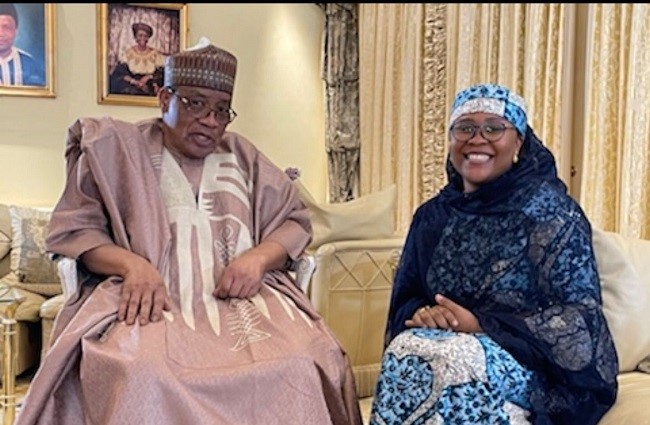A few months ago, I had the rare privilege of sitting down with General Ibrahim Badamasi Babangida (IBB) for an interview, an experience that felt like stepping into the pages of history itself. The weight of the moment was immense. Here I was, about to speak with a man who had not only witnessed Nigeria’s defining moments but had shaped them with his own hands.

The first time I was scheduled to meet him, anxiety had the upper hand. How do you prepare to sit across from a figure whose decisions once moved the nation? But my curiosity, the deep, undeniable thirst to hear history from those who lived it, was greater than my fear. So, I set out.
And then, I met him.
From the very first moments, IBB was unexpectedly warm, not the distant, imposing figure one might expect, but welcoming in a way that put me at ease almost instantly. Within five minutes, the nervousness faded. He spoke with the wisdom of experience, the ease of a storyteller, and the grace of a man who has made peace with time. It felt less like an interview and more like listening to a familiar grandfather recounting the stories of his youth, only these stories shaped a nation.
Watching the launch of his autobiography, which he titled “A Journey In Service,” I felt a deep sense of euphoria. It was history in motion, a moment of reflection, celebration, and acknowledgement. I couldn’t help but wish that all the other key figures of Nigeria’s past were here to tell their own stories. General Sani Abacha, Chukwuemeka Odumegwu Ojukwu, Moshood Kashimawo Olawale (MKO) Abiola, Sir Abubakar Tafawa Balewa, Ahmadu Bello, Obafemi Awolowo, Nnamdi Azikiwe, and Murtala Muhammed.
The architects of a complex, layered history, and the characters of what sometimes feels like a grand, unfinished film called Nigeria.
Imagine hearing Sir Abubakar Tafawa Balewa speak again, the golden voice that delivered Nigeria’s independence speech, a man of elegance and intellect whose life was tragically cut short in the first coup of 1966. What would he say now about the country he once led with such dignity?
Or Ahmadu Bello, the Sardauna of Sokoto, a man whose vision for Northern Nigeria remains unmatched, a leader who saw beyond his time. He championed education, unity, and a strong north, yet his life was also stolen in the violent coup that shook Nigeria’s foundation.
What about Chief Obafemi Awolowo, the philosopher-politician whose dream of an educated and industrialised Nigeria still lingers in the hearts of many? He saw the future before anyone else did: universal education, economic self-reliance, regional development. How different would Nigeria have been if his vision had been fully realised?
And then there’s Dr. Nnamdi Azikiwe, Zik of Africa, a man who fought, not just for Nigeria, but for the entire continent. The first president of Nigeria, a nationalist, an intellectual, a bridge between ideologies. His words once inspired a generation to believe in a Nigeria that belonged to all.
And, of course, MKO Abiola, the man who won an election yet never ruled. The symbol of democracy, a man whose victory represented hope, unity, and the possibility of a Nigeria where ethnicity did not divide. His story is one of power, resilience, and ultimate sacrifice.
Then there’s General Sani Abacha, a leader whose era marked a period of economic strength for Nigeria. His tenure saw the stabilisation of the Naira, extensive infrastructural development, and a robust foreign reserve policy. His administration prioritised national security and economic growth, ensuring that Nigeria remained self-reliant in key sectors.
And General Murtala Muhammed, the leader whose time in power was brief but transformative. His vision for an efficient, corruption-free Nigeria set a precedent for governance. Bold, decisive, and deeply patriotic, he embodied the spirit of change, one that Nigerians still remember with admiration. His assassination in 1976 cut short a dream that could have reshaped the nation.
And so, I find myself lost in thought. What if they could all sit in one room, telling their stories in their own words, reflecting on their choices, their victories, their regrets?
Moments like this remind me why I am, and always will be, a student of history. Because history isn’t just words on a page, it is the people, the emotions, the decisions, and the legacies they leave behind.
By Aisha Falke, Founder, Northern Hibiscus; Communications & Strategy Consultant to the Minister of State for Education.
